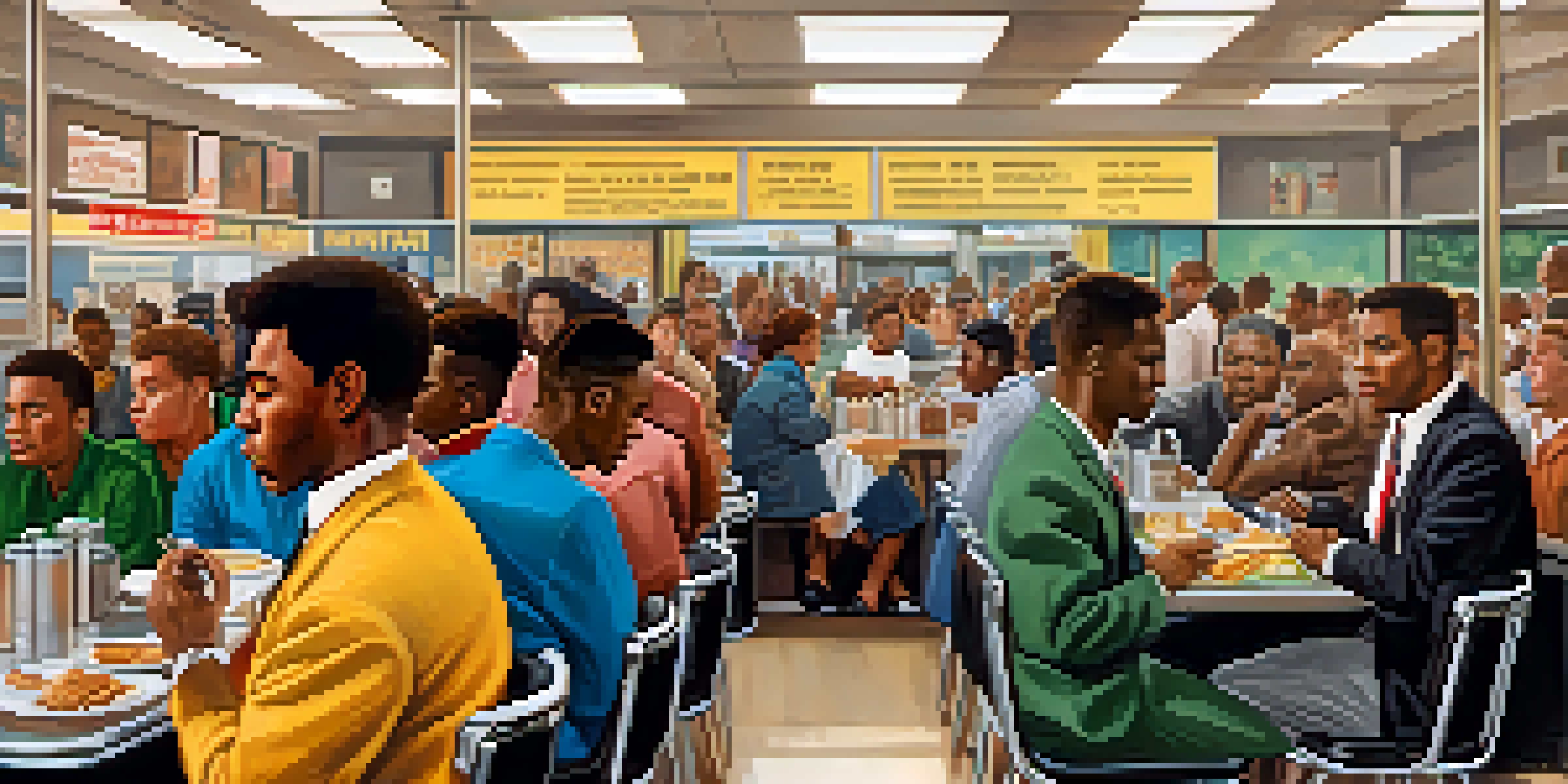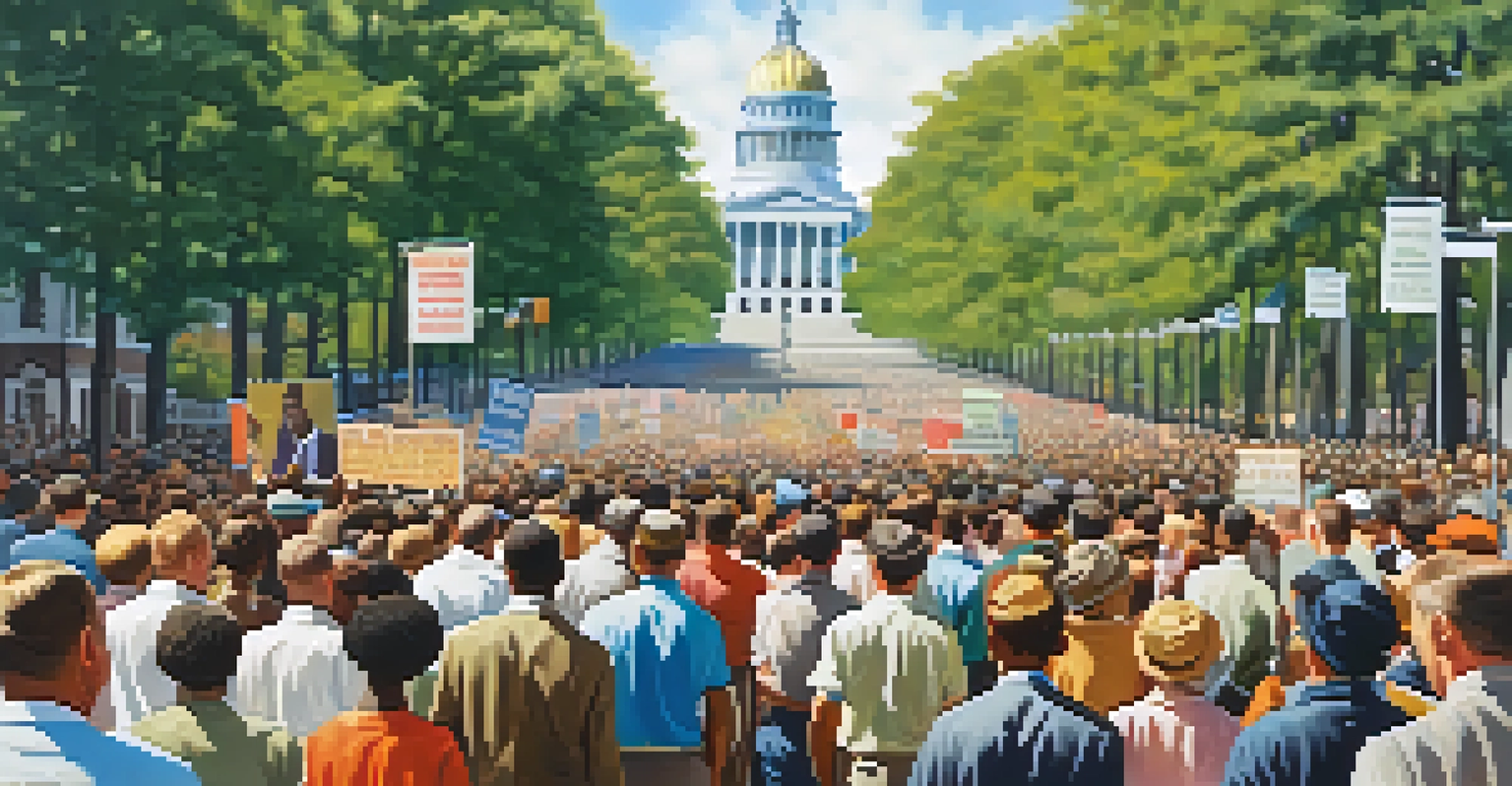Raleigh and the Civil Rights Movement: A Local Perspective

Historical Background of Raleigh and Civil Rights
Raleigh, North Carolina, has a rich history that intertwines with the broader Civil Rights Movement. As the state capital, it became a focal point for activists seeking equality and justice in the 1960s. The city was not just a backdrop; it played a pivotal role in shaping the narrative of civil rights in the South.
Injustice anywhere is a threat to justice everywhere.
The early years of the movement saw many local leaders emerge, inspired by national figures like Martin Luther King Jr. and Rosa Parks. They gathered in churches and community centers, discussing strategies to combat racial segregation and discrimination. These grassroots efforts laid the foundation for significant protests and demonstrations that would follow.
Understanding Raleigh's historical context helps illuminate the challenges faced by civil rights activists. From the fight against Jim Crow laws to the establishment of organizations advocating for social change, Raleigh's journey reflects the struggles and triumphs of countless individuals committed to achieving equality.
Key Figures in Raleigh's Civil Rights Movement
Raleigh was home to several influential figures who championed civil rights, including local leaders such as Reverend William Barber II. Barber became known for his passionate advocacy and ability to mobilize communities, emphasizing the importance of intersectionality in the fight for justice. His work with the North Carolina NAACP helped amplify the voices of marginalized groups.

Another notable figure was Ann Atwater, an activist who fought for school desegregation in the 1970s. Her determination and leadership in the community exemplified the relentless spirit of those striving for change. Atwater's legacy serves as a reminder of the power of local activism in challenging systemic inequality.
Raleigh's Civil Rights Activism
Raleigh played a pivotal role in the Civil Rights Movement, with local leaders and grassroots efforts shaping the fight for equality.
These leaders, among many others, were instrumental in rallying support and fostering dialogue around civil rights issues. Their contributions not only impacted Raleigh but also resonated throughout the state and beyond, inspiring future generations to continue the fight for justice.
Significant Events in Raleigh's Civil Rights History
One of the most pivotal events in Raleigh's civil rights history was the 1960 sit-ins at local lunch counters. Inspired by similar protests across the nation, students from North Carolina State University and Shaw University organized peaceful demonstrations to challenge segregation. Their courageous actions brought national attention to the cause and sparked further movements in the area.
The time is always right to do what is right.
Another landmark event was the 1963 March on Raleigh, which gathered thousands in support of civil rights legislation. This demonstration was not only a show of solidarity but also a call to action for local leaders to address issues of inequality and injustice. It demonstrated the collective strength of the community and its unwavering commitment to change.
These events were critical in shaping Raleigh's civil rights landscape. They highlighted the courage of individuals willing to stand up for their beliefs and the importance of community involvement in the fight for justice.
The Role of Education in Advancing Civil Rights
Education played a crucial role in Raleigh's civil rights movement, serving as both a battleground and a catalyst for change. Historically, schools were segregated, providing unequal resources to Black students compared to their white counterparts. Activists understood that achieving true equality required addressing educational disparities head-on.
One notable effort was the organization of Freedom Schools, which aimed to provide quality education to Black children while teaching them about their rights and history. These schools empowered students to become active participants in the civil rights movement, fostering a sense of identity and purpose.
Education as a Catalyst for Change
Education was crucial in advancing civil rights, as activists worked to address disparities and empower students through initiatives like Freedom Schools.
Through education, activists were able to challenge the status quo and advocate for desegregation in schools. Their efforts paved the way for future generations to receive equal educational opportunities, a cornerstone of the fight for civil rights.
Community Organizations and Their Impact
Community organizations were instrumental in mobilizing Raleigh residents during the civil rights movement. Groups like the Raleigh Chapter of the NAACP and the Student Nonviolent Coordinating Committee (SNCC) coordinated protests, voter registration drives, and educational campaigns. Their grassroots efforts were crucial in building momentum for change.
These organizations created a sense of solidarity among residents, encouraging them to come together in the pursuit of justice. They provided resources, training, and support for activists, amplifying their voices and demands for equality. The impact of these groups extended beyond Raleigh, influencing statewide and national movements.
The legacy of these organizations continues to inspire community activism today. Their work serves as a reminder of the power of collective action and the importance of fostering local leadership in the ongoing fight for civil rights.
Raleigh's Ongoing Journey Toward Equality
While significant progress has been made since the height of the civil rights movement, Raleigh's journey toward equality is ongoing. Many of the issues that activists fought against still persist today, reminding us of the work that remains. Racial disparities in education, housing, and employment continue to challenge the community.
Local leaders and organizations continue to advocate for change, focusing on issues such as police reform, affordable housing, and equitable access to education. The spirit of activism remains alive in Raleigh, as residents come together to address these challenges and push for a more just society.
Ongoing Struggles for Equality
Despite progress, Raleigh continues to face racial disparities in various sectors, with local leaders advocating for ongoing change and justice.
Raleigh's story is one of resilience and hope, demonstrating that the fight for civil rights is not confined to the past. It is a continuous effort, with each generation taking up the mantle to create a better future for all.
Reflecting on Raleigh's Civil Rights Legacy
As we reflect on Raleigh's civil rights legacy, it's essential to acknowledge the sacrifices made by countless individuals. Their bravery and determination have paved the way for the rights and freedoms we enjoy today. Each protest, sit-in, and meeting was a step toward a more equitable society, and their stories deserve to be remembered.
Raleigh's civil rights movement teaches us valuable lessons about the importance of community, collaboration, and perseverance. It reminds us that change is possible when individuals come together to stand against injustice. This legacy inspires current and future activists to continue the fight for equality.

Ultimately, Raleigh's journey through the civil rights movement is a testament to the power of grassroots activism. It highlights the impact that local communities can have in shaping the narrative of justice and equality, encouraging us all to play a role in fostering a more inclusive society.